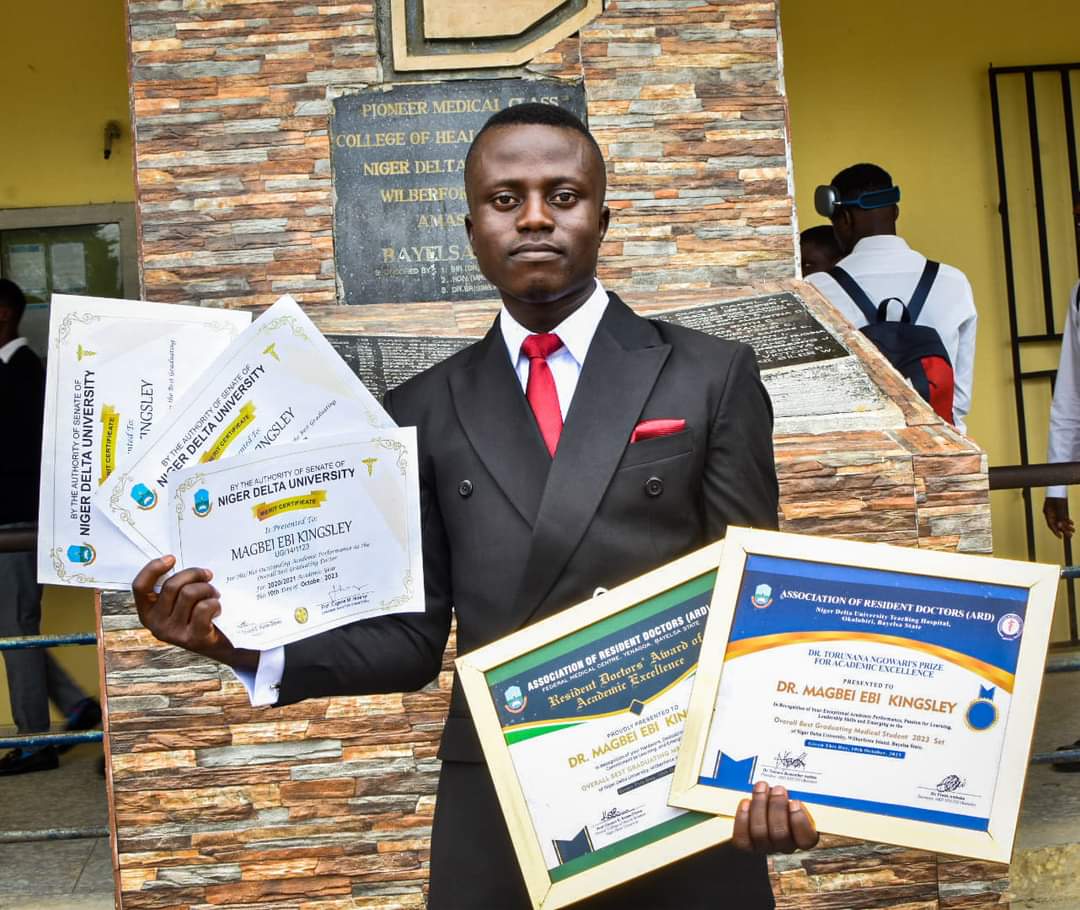Education
OPEN LETTER TO THE GOVERNOR OF DELTA STATE, Rt. Hon. Sheriff Oborevwori.

OPEN LETTER TO THE GOVERNOR OF DELTA STATE, Rt Hon Sheriff Oborevwori
Your Excellency sir,
I bring you season’s greetings from the loving people of Amaware Quarters of Obotebe town, Burutu Local Government Area.
Driven by a consciousness of your busy schedule, I intend to keep this open letter as brief as possible.
Sir, I write to intimate you on the excellent academic performance of Dr. Kingsley Magbei , a Deltan who emerged as overall Best Graduating Medical Student of the Niger Delta University, Wilberforce Island, Amassoma, Bayelsa State.
Aside the overall crown, Dr. Kingsley posted sublime performance as the;
- Best graduating doctor, faculty of clinical sciences
- Best graduating doctor, faculty of basic clinical sciences
His performances saw him cart home the FMC Yenagoa, ARD award for academic excellence for the overall best graduating student as well as the Dr. Torunana Ngowari’s prize for the overall best graduating student.
That is a summation of how brilliant a citizen you govern is.
To my dismay and that of many, the achievements of Dr. Kingsley went completely unnoticed by all strata of government in the state.
A dismay because social media was agog in celebrating his feat. Many indigenous and national online news outlets reported Kingsley’s dexterity.
Could it be that no government functionary took note of that?
A forgivable oversight, though.
Your Excellency, this open letter became necessary as a call to draw your attention to this amendable oversight.
As a concerned Deltan, who believes, advocates and contributes to the advancement of our dear state, I hold the firm belief that efforts such as Dr. Kingsley’s should not be greeted with blind eyes.
Why?
Similar groundbreaking achievements have been celebrated across boards.
For instance, Aminat Yusuf, who graduated as the best law student from the Lagos State University (LASU) with 5.0 Cumulative Grade Point Average (CGPA) was placed on salary by Governor Godwin Obaseki of Edo State.
Not only that, the Edo State Government will also sponsor her through Law School.
I urge Your Excellency to borrow a leaf from your Edo State counterpart, Godwin Obaseki and treat Dr. Kingsley’s case with importance.
I have the strong conviction that recognizing my brother’s feat will not only serve as a motivation to other Deltans, but will contribute in meeting your MORE Agenda in a way.
Recognizing the academic exploits of Nigerians such as Dr. Kingsley will create a sense of responsibility in their minds towards contribution to national development, and help curb the ‘Japa’ syndrome that has become a menace against the Nigerian economy, particularly the health sector.
Celebrating and recognizing Dr. Kingsley will also quell the thoughts from some quarters that he is probably not acknowledged because he is not from certain areas of the state.
Your Excellency, I beseech you as a pan Deltan to exercise due recognition to a quintessential Deltan, who hoisted the state’s flag with pride in academics.
Sincerely,
Tare Magbei
MD/CEO, Daily Report Nigeria
VCC:
Hon Emomotimi Guwor
Delta State House of Assembly
Commissioner for Health, Delta State
Commissioner for Higher Education, Delta State
Bursary & Scholarship Board, Delta State

Education
EDUCATION: Ekpomupolo-led Warri South-West Legislature Moves to introduce Ijaw, ltsekiri Language in Schools

By Favour Bibaikefie
A major step toward strengthening cultural preservation has been taken in warri south-west Local Government Area as the Leader of the Legislative Arm, Rt Hon. Idukedoumene Samuel Ekpemupolo, has sponsored a bill seeking the compulsory teaching of ijaw and itsekiri languages in all primary school across the LGA.
The proposal. Which covers both government and privately owned primary school, aims to ensure that children in region grow up grounded in their native tongues while gaining a deeper understanding of their cultural roots.
In line with established legislative norms, Rt. Hon. Samuel temporarily relinquished his role as presiding officer to the Deputy Leader, Rt. Hon Erewe Charles , who supervised the session during the presentation of the bill. Lawmakers commended the move as a clear display of respect for legislative order and due process.
Under the bill, primary school situated in predominantly Ijaw communities will adopt Ijaw as a compulsory subject, while those in Itsekiri areas will teach Itsekiri. The intention is to encourage early mastery of indigenous languages, enabling young learners to appreciate local history, idioms, folklore, and values.
Rt. Hon. Samuel, while speaking on the importance of the proposal, emphasized that many indigenous languages are gradually losing ground among the younger generation. He described the bill as a timely intervention to revive linguistic pride, reinforce cultural identity, and promote harmony between the Ijaw and itsekiri people.
Beyond cultural preservation, the legislation is expected to open new employment opportunities for trained language educators and curriculum experts-benefits that will positively impact educational development in the LGA.
Stakeholders see the bill as a transformative effort that could shape the cultural and academic direction of warri south-west for years to come. The House has begun deliberation, with expectations that the proposal will receive broad support due to its long-term significance for the region’s children and communities.
Education
FG Adjusts Tertiary Admission Rules, Drops Mathematics as Compulsory for Arts and Humanities

By: Derick Peretengboro
The Federal Government has introduced a major change to admission requirements for higher institutions across Nigeria, announcing that Mathematics will no longer be a compulsory subject for candidates applying to study Arts and Humanities.
The policy update was revealed in Abuja on Tuesday through a statement issued by the Ministry of Education’s spokesperson, Mrs. Folasade Boriowo.
For years, students seeking admission into universities, polytechnics, and colleges of education were required to secure five credits, including English Language and Mathematics, in their Senior School Certificate Examination (SSCE) to qualify.
New National Admission Framework
According to the Ministry, the newly revised National Guidelines for Entry Requirements into Nigerian Tertiary Institutions are aimed at modernizing admission criteria, removing outdated restrictions, and widening access to higher education while maintaining quality standards.
“The revised framework eliminates unnecessary barriers to tertiary education while preserving academic excellence and learning outcomes,” the statement said.
Under The New Structure:
Universities: Candidates must obtain five credits, including English Language, in relevant subjects within two sittings.
Mathematics remains compulsory for Science, Technology, and Social Science courses.
Polytechnics (ND): At least four credits in relevant subjects, including English Language for non-science courses and Mathematics for science-related programmes.
Polytechnics (HMD): Five credits, including both English Language and Mathematics.
Colleges of Education (NCE): A minimum of four credits in relevant subjects. English is compulsory for Arts and Social Sciences, while Mathematics is required for Science, Technical, and Vocational disciplines.
The Minister of Education, Dr. Tuning Alausa described the policy reform as a strategic move to expand educational access and foster inclusivity.
He emphasized that the decision aligns with global best practices and is intended to ensure that capable students in non-science fields are not denied opportunities due to rigid entry requirements.
Education
My Study and Reading Strategies
My Study and Reading Strategies
By Lady Ejiro Umukoro
STUDYING is often a strenuous activity for many individuals; it is considered tasking, difficult to keep up to, time consuming, and sometimes, unproductive. This article is targeted at helping you create an effective study technique that transcends those feelings.
To study effectively and meet your desired goal, you need focus. One effective technique that can greatly help you is setting a clear goal of what you plan to achieve at the end of a stipulated timeframe. While keeping the goal behind your studying in mind, create a smaller and achievable goal that brings you nearer to your overall focus and examine them after each study session to help you track your progress.
A well-known but disregarded technique is creating a study schedule that aligns with your goal. Often, it is easier to create a study schedule than to follow it. So, you must tell yourself it is worth it.
Developing a consistent study schedule ensures regular and manageable study periods to prevent last-minute cramming. Discipline is mostly needed for you to create a study schedule and achieve its intended purpose. To remain on track, visualise the poor outcome that can emanate from not being disciplined and the disappointment that it could bring. Create a study schedule that aligns you with your goal and be intentional about the discipline necessary for its success.
Active listening is an effective study technique you must embrace. A firm starting step that could immensely aid your retention and studying is the stage of active listening. As earlier mentioned, some people find studying time consuming or even unproductive; this may have emanated from not paying enough attention when the subject matter was being taught. Active listening reduces the struggle of having to study for a long time, forgetting information easily, and feelings of low productivity. Active listening will also help you incorporate learning strategies, such as summarising information, teaching others, or discussing topics with peers, enhancing your comprehension and retention.
Employ the Pomodoro technique in effectively aiding your studying. The Pomodoro technique involves incorporating a five-minute break after every 25 minutes study session. To maximise the Pomodoro technique, create a to-do list and a timer, and assign 25 minutes to each task on the list. When the timer rings, take an immediate break, and go on a longer 15-30 minutes break after four Pomodoro sessions. Do this to reduce burn out, build consistency and establish routines, enhance productivity, and boost concentration.
Take notes while studying. Although writing may not be considered a preferential activity for you, it is of prime importance in measuring what you really know and can remember. Explore taking effective notes through methods such as Cornell or mind mapping. They enable you to identify and link similar concepts that could aid in understanding and remembering areas of emphasis or importance. If you do not like to write, consider drawing different structures or illustrations close to you and mindfully link them to what you study about. This can help you recollect information faster and effectively.
Always engage with, practise, and test your knowledge. Regularly create quizzes or activities to test the knowledge you have gained after every study session. Practising tests or quizzes helps you to solidify your knowledge, see areas where improvements are necessary, and equip you with the format and pressure of actual exams. As you study, list out questions or quizzes to go over, always practise after every study session, and stop at your exact timer for honest assessment or evaluations.
Eliminate distractions while reading. Create an environment for yourself that is free from distracting activities, sounds, gadgets, or occasions. Consider using noise-cancelling headphones or a quiet study area in maintaining concentration and interest. Rather than allowing distractions to be a setback, you can incorporate these distractions – if they include some activities you like or gadgets you enjoy – in your short breaks for more rejuvenation or morale boost. Some, however, say they enjoy reading with some noise around them.”
Do what works from you. To achieve that, learn more about how you enjoy studying and reading.
©LADY EJIRO UMULORO IS A MEDIA PERSONALITY (LIGHTRAY MEDIA), POLICY ADVOCATE, KEYNOTE SPEAKER, AND AUTHOR.
#GoDoYou! #DISTORTIONbyEjiroUmukoro #unlearning





